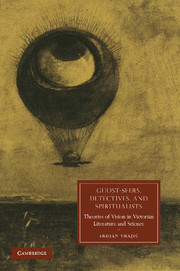Book contents
- Frontmatter
- Contents
- Acknowledgments
- List of abbreviations
- Introduction
- PART I OUTER VISION, INNER VISION: GHOST-SEEING AND GHOST STORIES
- PART II SEEING IS READING: VISION, LANGUAGE, AND DETECTIVE FICTION
- 5 Visual learning: sight and Victorian epistemology
- 6 Scopophilia and scopophobia: Poe's readerly flâneur
- 7 Stains, smears, and visual language in The Moonstone
- 8 Semiotics v. encyclopedism: the case of Sherlock Holmes
- PART III INTO THE INVISIBLE: SCIENCE, SPIRITUALISM, AND OCCULT DETECTION
- Coda
- Notes
- Bibliography
- Index
- CAMBRIDGE STUDIES IN NINETEENTH-CENTURY LITERATURE AND CULTURE
8 - Semiotics v. encyclopedism: the case of Sherlock Holmes
Published online by Cambridge University Press: 06 July 2010
- Frontmatter
- Contents
- Acknowledgments
- List of abbreviations
- Introduction
- PART I OUTER VISION, INNER VISION: GHOST-SEEING AND GHOST STORIES
- PART II SEEING IS READING: VISION, LANGUAGE, AND DETECTIVE FICTION
- 5 Visual learning: sight and Victorian epistemology
- 6 Scopophilia and scopophobia: Poe's readerly flâneur
- 7 Stains, smears, and visual language in The Moonstone
- 8 Semiotics v. encyclopedism: the case of Sherlock Holmes
- PART III INTO THE INVISIBLE: SCIENCE, SPIRITUALISM, AND OCCULT DETECTION
- Coda
- Notes
- Bibliography
- Index
- CAMBRIDGE STUDIES IN NINETEENTH-CENTURY LITERATURE AND CULTURE
Summary
“Nature is the Book,” Whewell writes, “and Man is the Interpreter. The facts of the external world are marks, in which man discovers a meaning, and so reads them” (PIS I, p. 37). Interpretation is the foundation of the inductive sciences, and interpretive work, such as the discovery of natural laws, is essentially a reading exercise: “To trace order and law in that which has been observed, may be considered as interpreting what nature has written down for us, and will commonly prove that we understand her alphabet,” which is to say “the meaning and structure of her language” (PIS II, pp. 64–5). While Whewell identifies the constitutive elements of the general inductive method, at the core of every individual act of discovery there is something irreducible to a formula or set of rules: “For an Art of Discovery is not possible. At each step of the progress of science, are needed invention, sagacity, genius; – elements which no Art can give” (PIS I, p. viii). The inductive method can be taught, but “that peculiar Sagacity which belongs to the genius of a Discoverer … cannot be limited by rules, or expressed in definitions” (PIS II, p. 40). Successful colligations of facts are more methodologically principled and structured than guesses, but they are also inspired leaps of the scientific imagination, “felicitous and inexplicable strokes of inventive talent” (PIS II, p. 41).
- Type
- Chapter
- Information
- Ghost-Seers, Detectives, and SpiritualistsTheories of Vision in Victorian Literature and Science, pp. 119 - 128Publisher: Cambridge University PressPrint publication year: 2010



